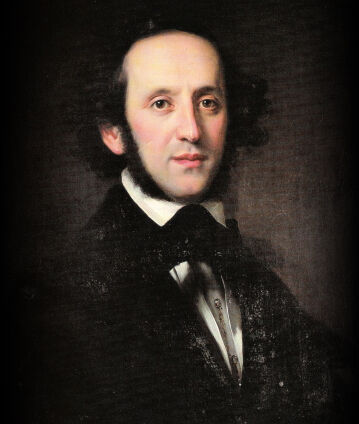Felix Mendelssohn
Composer
Felix Mendelssohn, who composed at breathtaking speed even as a child, was highly gifted musically. After acquiring exceptional piano skills during lessons with virtuosos such as Johann Nepomuk Hummel and Ignaz Moscheles, he made his first public appearances at the age of nine as a soloist in, among others, Johann Ladislaus Dussek’s Concerto militaire.
Felix Mendelssohn was born into a respected and wealthy Jewish family in Hamburg, which moved to Berlin in 1811 due to the French occupation of the Hanseatic city. His parents converted to Protestantism. At the age of seven, Felix was baptised together with his three siblings – from then on they bore the name Bartholdy. Felix received piano and violin lessons together with his sister Fanny before becoming a member of the Berlin Singakademie. There he studied sacred music under the direction of Carl Friedrich Zelter, and also attended lectures by Georg Wilhelm Friedrich Hegel. In 1822, the Mendelssohns established their “Sunday Music”, house concerts at which the children, together with members of the royal court orchestra, performed not only the classics of the chamber repertoire but also numerous works by the young Felix. His overture to Shakespeare’s A Midsummer Night’s Dream brought him his first resounding success. Mendelssohn also excelled as a conductor. In 1829, he performed Johann Sebastian Bach’s St Matthew Passion – a concert of historical significance, as Bach’s music had practically disappeared from the concert repertoire after his death. Mendelssohn’s performance ushered in a Bach renaissance. After extensive educational trips to Great Britain and Italy, the composer then became the city music director of Düsseldorf. For the 1835/36 season he then took over the direction of the Leipzig Gewandhaus Orchestra, with which he conducted not only many works by Bach, Weber, Beethoven and Schumann but also the posthumous premiere of Franz Schubert’s Symphony no. 9 in C major “The Great” – a pioneering programme design. It was also pioneering that Mendelssohn was a conductor who took on all the rehearsal work himself, instead of leaving it to the concertmaster. As such, he is considered the first conductor in today’s sense. His last years in Leipzig, where Mendelssohn founded Germany’s first conservatory in 1843, were marked by numerous trips. The composer was not to recover from the unexpected death of his sister Fanny in May 1847: after a short, serious illness – Mendelssohn suffered several strokes – he died in Leipzig on 4 November 1847.